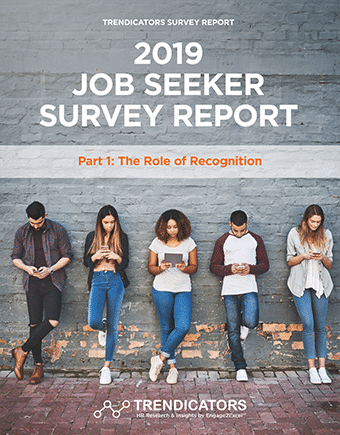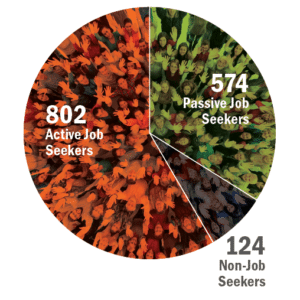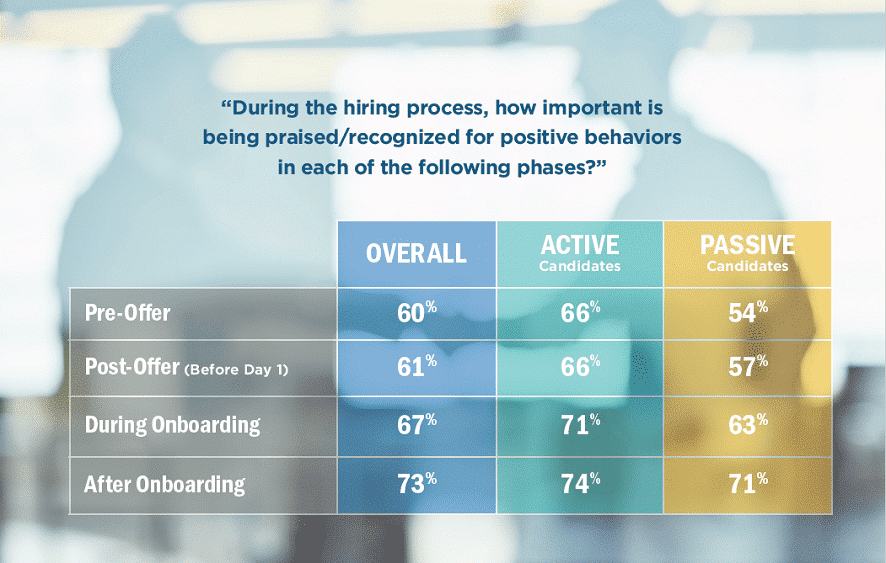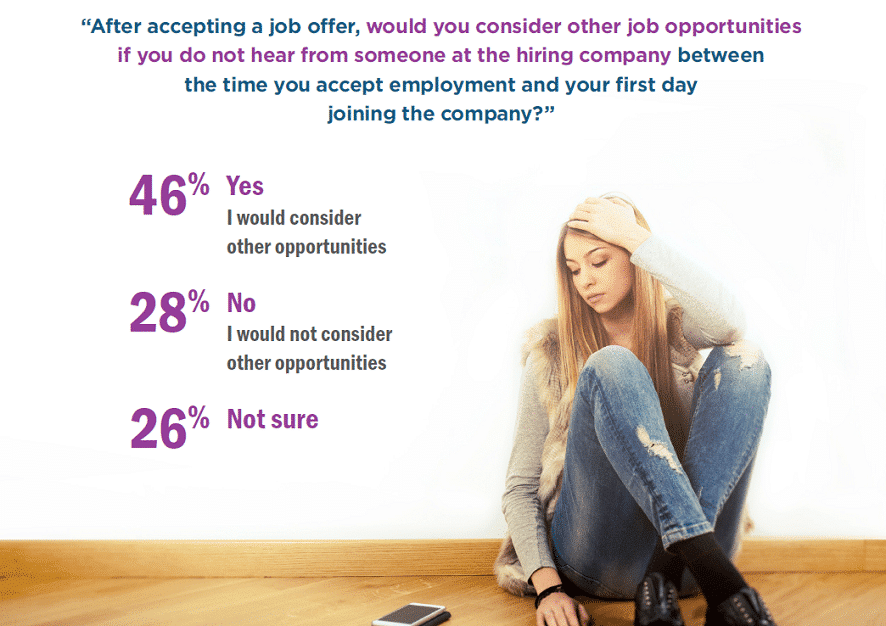2019 Job Seeker Survey Report

INTRODUCTION
The tightest market for talent in five decades has resulted in a cavalcade of content from thought leaders, analysts and vendors, most of it focused on fixing what’s broken in current recruitment processes. Improving the candidate experience is a hot topic, because it’s a buyer’s market.
Recruitment marketing, which represents the largest portion of most talent acquisition budgets, is getting a lot of attention, and the prevailing best practices have their origins in consumer marketing. However, whereas consumer marketing is grounded in research on attitudes, behaviors and preferences (what consumers really want), there is a surprising lack of research on what candidates really want.
Recognition is one of the most important variables that influence candidates’ perceptions throughout the hiring process.
The 2019 Job Seeker Survey Report is a three-part series that explores what candidates really want. Part 1 explores the role of recognition in the candidate experience. Why is recognition important? More than three decades of research reveals that recognition plays a powerful role in determining levels of engagement, performance and loyalty in employees. As the results of this survey show, recognition is also one of the most important variables that influence candidates’ perceptions throughout the hiring process.
This survey report is the result of research and analysis conducted by Engage2Excel’s chief scientific officer, Jack Wiley, Ph.D. Jack is well-known for his RESPECT framework, which focuses on what employees really want from their employer. The acronym RESPECT stands for Recognition, Exciting Work, Security, Pay, Education and Career Growth, Conditions and Truth.
In Part 2 of the 2019 Job Seeker Survey Report, we examine candidate perceptions of recruiting. In Part 3 we explore the importance of pre-boarding and onboarding.
Survey Demographics
Number of Respondents: 1,500
Countries Represented: United States
Industries Represented: All major industries
Respondent Demographics: U.S. adult workers in all job types with proportionate representation of gender, age group and racial/ethnic origin
Margin of Error: 95% confidence level +/- 1.5%

The results published in this report are based on a survey of 1,500 individuals, from all major industry sectors and demographic groups, including 802 active job seekers, 574 passive job seekers and 124 non-job seekers.
Trendicators is the research division of Engage2Excel, a leading provider of employee recognition, engagement survey and talent acquisition solutions. Trendicators provides original research, along with reports on insights and best practices from industry leaders and experts.
Download
 hbspt.cta.load(123973, '995487df-ad3a-45f2-98bc-d5a820a88f08', {});
hbspt.cta.load(123973, '995487df-ad3a-45f2-98bc-d5a820a88f08', {});
Why do candidates accept or reject job offers?
Sometimes, attitudinal research data challenges conventional wisdom. Such is the case with the results of our survey on the top reasons candidates accept and reject job offers.
In a tight job market, one would assume that compensation would be the most important acceptance or rejection variable. However, in 2019, as was the case in our 2017 survey, candidates reveal that being treated with dignity and respect, a major component of recognition, is the top reason for accepting a job offer and their number one reason for rejecting an offer. What has changed is that fair compensation, the third most influential variable in 2017, is now the second in determining job acceptance, followed by job fit. The other change in the past two years is that lack of respect has replaced job fit as the most important reason for rejecting a job offer.
Survey Takeaway: If you are looking for ways to improve your overall candidate experience, focus on how your recruiters and hiring managers interact with, engage and appreciate candidates.
TOP REASONS FOR ACCEPTANCE
Respect 27%
Fair Compensation 23%
Job Fit 21%
TOP REASONS FOR REJECTION
Lack of Respect 26%
Poor Job Fit 20%
Unfair Compensation 17%
Download
 hbspt.cta.load(123973, '995487df-ad3a-45f2-98bc-d5a820a88f08', {});
hbspt.cta.load(123973, '995487df-ad3a-45f2-98bc-d5a820a88f08', {});
Why do people seek employment elsewhere?
Treating employees like customers is more than just a good idea. It’s a sound business decision. Replacing a customer is seven times more expensive than retaining one, and the cost of losing a productive employee can be just as high, or even higher.
When we asked job seekers what on-the-job factors would cause them to seek employment elsewhere, the responses reflect changes in the economy. Wages in the U.S. increased 4.2% in February over the previous year. This year, the opportunity to make more money elsewhere tops the list of reasons why employees would consider leaving their employer. When we asked this question two years ago, lack of respect topped the list, followed by compensation.
Failure to treat employees with dignity and respect, along with high stress and inadequate social working conditions, are the second most important contributors to voluntary employee turnover, followed by uninteresting work and concern about job security.
Survey Takeaways: Make sure your total compensation and benefits are competitive, and clearly understood by employees and candidates, and conduct an annual employee survey to evaluate causes that may negatively influence employee engagement, productivity and loyalty.
“What is the most important reason you are or would be willing to leave your current employer?”
20% Unfair Compensation
16% Lack of Respect
16% High Stress & Inadequate Social Conditions
13% Uninteresting Work
13% Concern about Job Security
Download
 hbspt.cta.load(123973, '995487df-ad3a-45f2-98bc-d5a820a88f08', {});
hbspt.cta.load(123973, '995487df-ad3a-45f2-98bc-d5a820a88f08', {});
Why is it important to promote recognition and rewards programs?
While the job market and economy have had an impact on job seeker perceptions and priorities, one variable remains largely unchanged. When we asked candidates about the role of a company’s recognition and rewards program in influencing their pursuit of a job with that company, a majority said that it was either important or very important, as they did in 2017. Ranked highest by active job seekers, millennials and men, recognition and rewards programs are an important criterion for employer evaluation.
Survey Takeaway: Re-evaluate your recognition and rewards program periodically, actively promote this important benefit internally and make sure that it occupies a prominent place on your career site.

Download
 hbspt.cta.load(123973, '995487df-ad3a-45f2-98bc-d5a820a88f08', {});
hbspt.cta.load(123973, '995487df-ad3a-45f2-98bc-d5a820a88f08', {});
How important is being recognized or praised during the hiring process?
Human emotions play a role in influencing important life decisions. Whether choosing a college, evaluating a major purchase or deciding between competing job offers, how one “feels” about an opportunity often outweighs factual analysis in determining the outcome.
As the results in the table below demonstrate, praising and recognizing candidates for positive behaviors throughout the recruiting process, from pre- to post- hire, is important to all candidates. Interactions with recruiters, screeners, interviewers and hiring managers provide candidates with an important indicator of how they will be regarded as employees.
Survey Takeaways: Educate each member of your talent acquisition team about the importance of praising and recognizing positive behaviors among all candidates, and consider hiring undercover candidates to audit recruitment experiences annually.

Download
 hbspt.cta.load(123973, '995487df-ad3a-45f2-98bc-d5a820a88f08', {});
hbspt.cta.load(123973, '995487df-ad3a-45f2-98bc-d5a820a88f08', {});
How important is hearing from a new employer before the first day?
The best candidates in today’s job market receive multiple offers. But the war for talent doesn’t end when an offer of employment is accepted.
Failure to communicate with new hires between the time of acceptance and the first day on the job is quite common. It has significant negative consequences. This lack of communication not only sets the wrong tone for starting a new relationship but also triggers doubt. Nearly half of all job seekers surveyed said they would consider other opportunities if they didn’t hear from an employer between offer acceptance and day one.
Survey Takeaways: Review your company’s new employee communications program, replace standardized form letters with engaging and personalized communications and consider sending branded gift items to make new hires feel welcome.

Download
 hbspt.cta.load(123973, '995487df-ad3a-45f2-98bc-d5a820a88f08', {});
hbspt.cta.load(123973, '995487df-ad3a-45f2-98bc-d5a820a88f08', {});